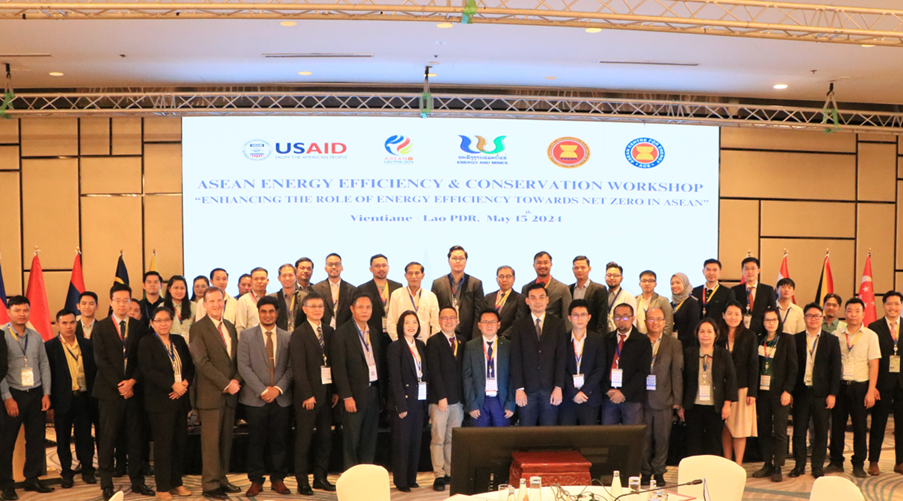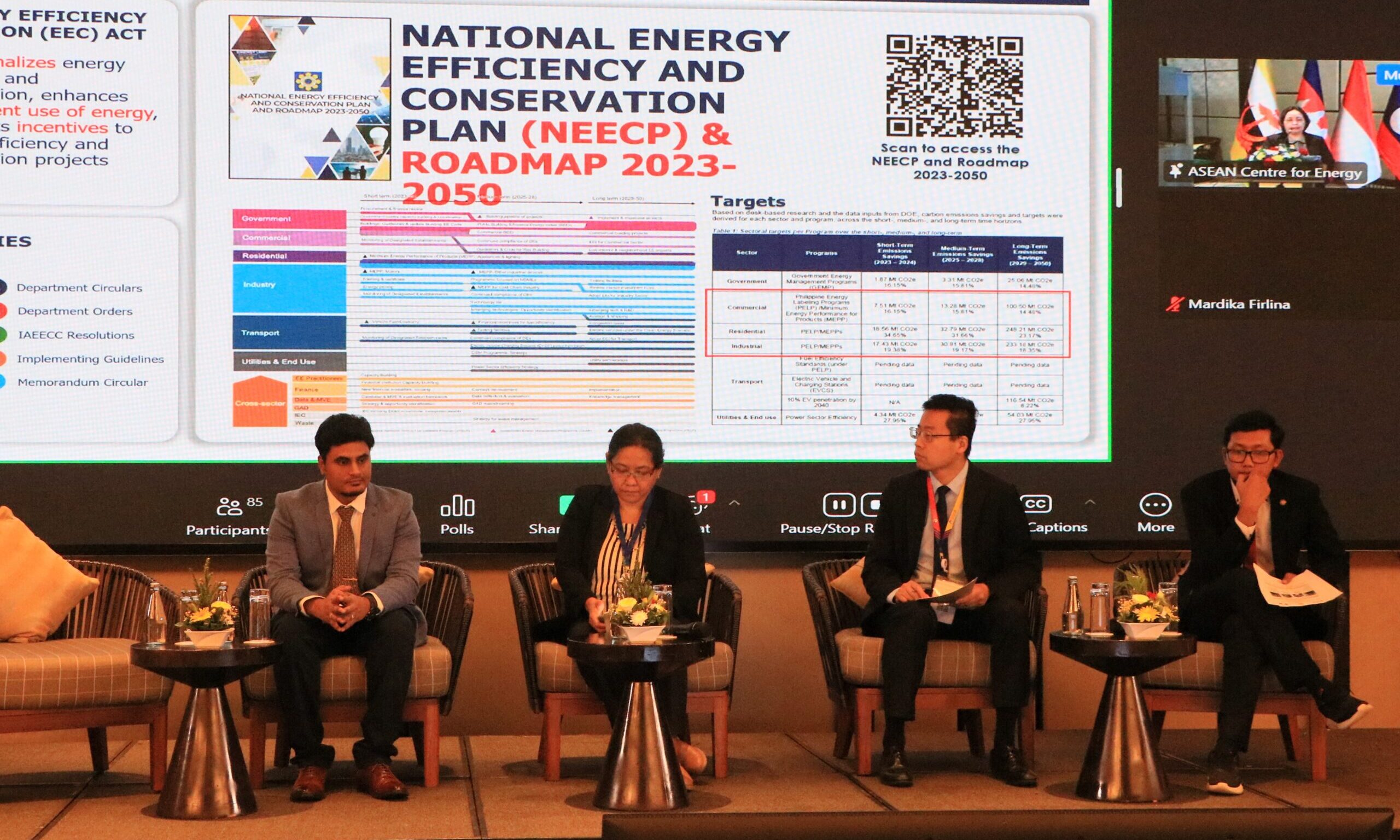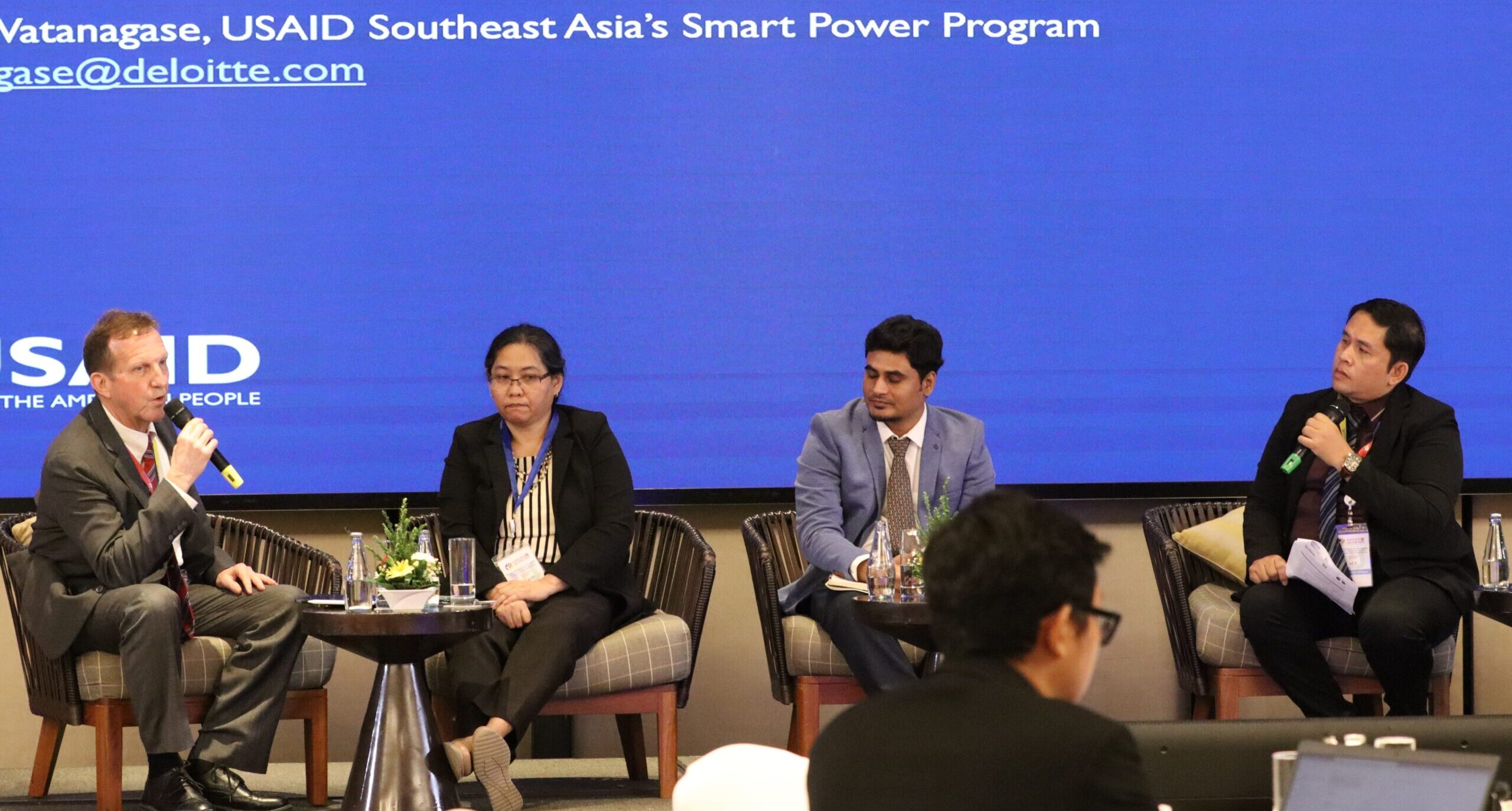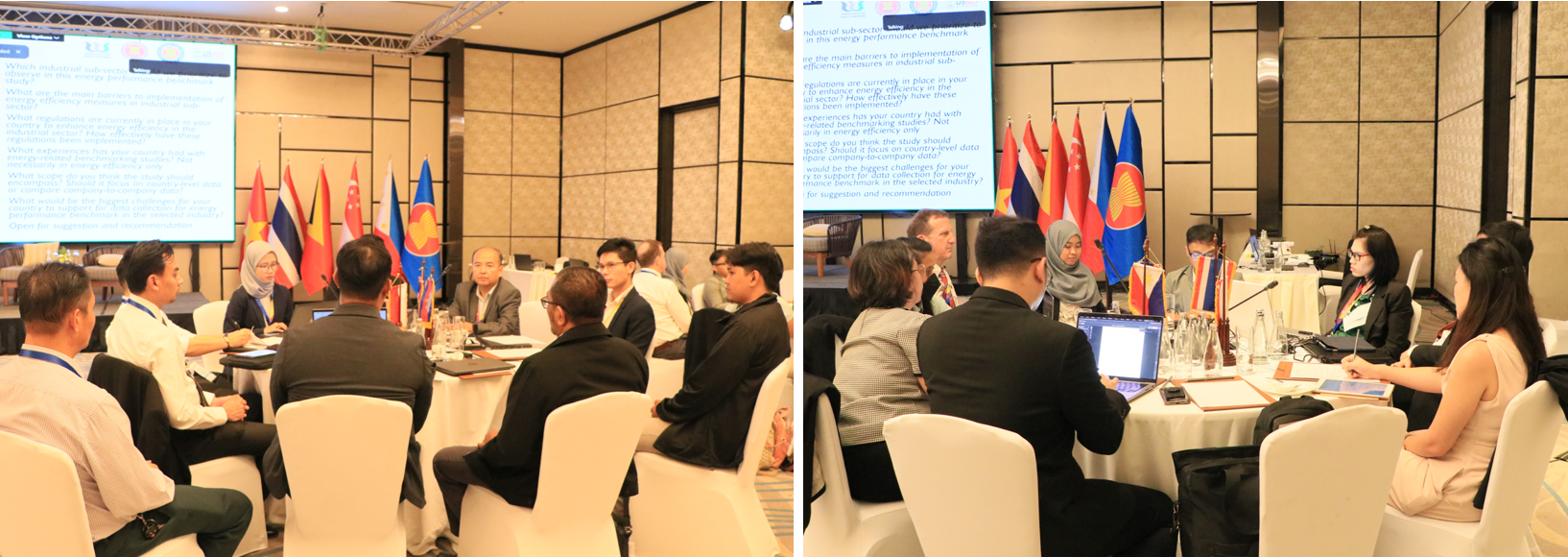Menu

Photo 1. ASEAN Energy Efficiency & Conservation Workshop Participants
On 15 May 2024, the ASEAN Centre for Energy (ACE), supported by the USAID Southeast Asia Smart Power Program (SPP) and hosted by the Ministry of Energy and Mines, Lao PDR, organised the ASEAN Energy Efficiency & Conservation Workshop: Enhancing the Role of Energy Efficiency Towards Net Zero in ASEAN. Held in Vientiane, the workshop is a part of the 28th Energy Efficiency and Conservation Sub Sector Network (EE&C-SSN) Associated Meetings, attended physically by several ASEAN Member States (AMS) and representatives from ASEAN Secretariat, International Organisations, Dialogue Partners, and private sectors. In total, the workshop was attended by 262 participants, with 66 attending in person and 196 joining online via the Zoom platform. The attendance demographics were 65.3% male, 34.3% female, and 0.4% undeclared.

Photo 2. Opening remarks from Chantho Milattanapheng (left) and Apiradee Thammanomai (right)
The workshop commenced with remarks from Chantho Milattanapheng, Director General, Department of Energy Efficiency and Promotion, Ministry of Energy and Mines, Lao PDR, stressed the essential role of regional collaboration in enhancing energy efficiency. Apiradee Thammanomai, EE&C-SSN Coordinator and Director of the Strategy and Planning Division at Department of Alternative Energy Development and Efficiency of Thailand, emphasised the workshop’s crucial role in exchanging best practices and fostering partnerships to address ASEAN’s rising energy demands.
Mardika Firlina, Associate Research Analyst of Energy Efficiency and Conservation (CEE) Department at ACE, set the stage by reviewing the region’s current achievements and outlining the steps necessary to achieve the targets set by the ASEAN Plan of Action for Energy Cooperation (APAEC) Phase II for 2025. The ASEAN Energy Efficiency and Conservation (EE&C) workshop featured three focused sessions, each addressing a pivotal area of energy efficiency:
Session 1: The Role of High-Efficiency Appliances and Strengthening Mechanisms for MEPS in Achieving Net Zero Building

Photo 3. Dr. Zulfikar Yurnaidi, Acting Manager of CEE Department at ACE, moderating the panel discussion session 1 about high-efficiency appliances.
The first session, moderated by Dr. Zulfikar Yurnaidi, Acting Manager of CEE Department at ACE, focused on integrating high-efficiency appliances to strengthen Minimum Energy Performance Standards (MEPS) and achieve net-zero buildings.
Lana Rose A. Manaligod from the Philippines’ Department of Energy highlighted several initiatives, including the Philippine Energy Labelling Programme (PELP), which aims to achieve higher MEPS. Johnny Wang from Huawei discussed sustainable cooling systems for data centres, emphasising the benefit of smart power systems and prefabricated modular designs. Nanik Rahmawati from CLASP introduced the Net Zero Heroes initiative, which focuses on stringent appliance policies and their integration into national climate plans.
Furthermore, Saikiran Kasamsetty from the United Nation Environment Program’s United for Efficiency (UNEP-U4E) presented an overview of U4E’s projects to promote higher MEPS for appliances in ASEAN. The U4E model regulation guidelines were also discussed, setting essential efficiency thresholds for appliances to support environmental sustainability. The guidelines align with regional efforts, such as the ASEAN Cool Initiative and the Regional Product Database project.
Session 2: Enhancing the Role of Green Procurement Scheme and Bulk Procurement in ASEAN to Incentivise Sustainable Cooling

Photo 4. Rio Jon Piter Silitonga, the Senior Officer from the CEE Department at ACE, moderating the panel discussion session 2 about green and bulk procurement.
Moderated by Rio Jon Piter Silitonga, Senior Research Analyst of CEE Department at ACE, the second session focused on the role of green and bulk procurement schemes in driving market transformation for cooling systems within ASEAN. Dr. Peter du Pont, from ACE-Partners representing SPP, highlighted that bulk procurement could facilitate the adoption of sustainable cooling. Nanik Rahmawati from CLASP discussed the effective role of energy labelling programs in green procurement, citing Indonesia’s mandatory energy labelling policy as a driver for transitioning to super-efficient appliances.
Moreover, Soumya Prasad Garnaik from the Global Green Growth Institute presented a case study from India’s UJALA Domestic Efficient Lighting Program, which successfully reduced electricity consumption and CO2 emissions through innovative consumer outreach and a zero-interest EMI payment scheme. Saikiran Kasamsetty from UNEP-U4E elaborated on the sustainable and green public procurement technical guidelines, which encompass lighting, refrigerators, and room air conditioners. Supplementing the guidelines, U4E also offers a toolkit and a Sustainable Public Procurement Excel Spreadsheet Tool to compare the economic costs and environmental impacts.
This session underscored the potential of bulk procurement to enhance energy efficiency in ASEAN’s cooling systems. However, challenges such as low market awareness, lack of technical guidelines, and limited regulatory frameworks were noted. Collaboration between governments, industry stakeholders, and international partners is crucial to advancing the adoption of sustainable cooling solutions.
Session 3: Energy Performance Benchmarks to Drive Improvements in Energy Efficiency for Energy-Intensive Industry in ASEAN

Photo 5. The workshop and Focus Group Discussion (FGD) in session 3 were attended by the representatives from ASEAN Member States.
The final session, led by Wisaruth Maethasith from DEDE Thailand, focused on establishing energy performance benchmarks for energy-intensive industries as the major energy consumers in ASEAN. Dan Resky Valeriz, Research Analyst of CEE Department at ACE, underscored the critical need for energy performance benchmarks in in energy-intensive sub-sectors such as non-metallic minerals.
Natalie Kauf from the International Energy Agency shared insights on global practices, noting the increase in CO2 emissions from energy combustion in 2022, which underscored the significant impact of industrial energy consumption on global scales. Dr. Yoshitaka Ushio from the Energy Conservation Center Japan presented Japan’s successful energy efficiency benchmarking systems, which offers a robust framework for assessing and setting energy efficiency goals.
The AMS Focus Group Discussion then examined how energy benchmarking could be effectively applied in energy-intensive sub-sectors, such as cement and food and beverage. The group identified challenges such as data availability, low public awareness, and weak policy enforcement. Participants discussed both general and specific operational benchmarking approaches and emphasised the need for ACE to study further the regional energy benchmarking for industry. This session highlighted the significance of energy benchmarks in developing a regional database and promoting the exchange of best energy efficiency practices in the industrial sector.

Photo 6. Mardika Firlina (left) and Dan Resky Valeriz (right) as Speakers
Collaborative Outcomes and Future Directions
Before the concluding remarks, Irma Ramadan, Associate Senior Officer from the CEE Department at ACE, presented a comprehensive summary of the key points discussed during the event. The workshop focused on sharing best practices, identifying challenges, and exploring opportunities to enhance efficiency standards. It concluded with a consensus on conducting a detailed benchmarking study by ACE in 2024, aimed at improving energy efficiency measures across ASEAN’s industrial sectors.
The results of the pre- and post-workshop surveys indicated a significant improvement in participants’ understanding of the topics discussed during the workshops. In the first session, which focused on the role of high-efficiency appliances, the proportion of correct responses increased from 67% to 88%. Similarly, the second session on the role of green and bulk procurement schemes recorded a rise in correct answers from 64% to 79%. The third session, which discussed energy performance benchmarks for energy-intensive industries, showed a 10% improvement in correct responses, rising from 22% to 32%. Overall, 60% of participants strongly agreed that the workshop effectively addressed the primary challenges in enhancing energy efficiency across Southeast Asia.

Photo 7. Dr. Zulfikar Yurnaidi (left) and Irma Ramadan (right) Wrapped Up the Workshop
In his closing remarks, Dr. Zulfikar Yurnaidi reiterated the importance of collaboration among AMS, IOs/DPs, and private sectors. He praised the workshop for its pivotal role in shaping a more sustainable energy landscape for ASEAN. The ASEAN EE&C Workshop represents a significant advancement in the regional efforts to tackle energy challenges, setting the stage for more integrated and sustainable energy solutions. The outcomes of this event are expected to significantly impact future energy policies and promote a cooperative approach to achieving energy efficiency and conservation goals across the region.
The workshop materials can be downloaded from here.
